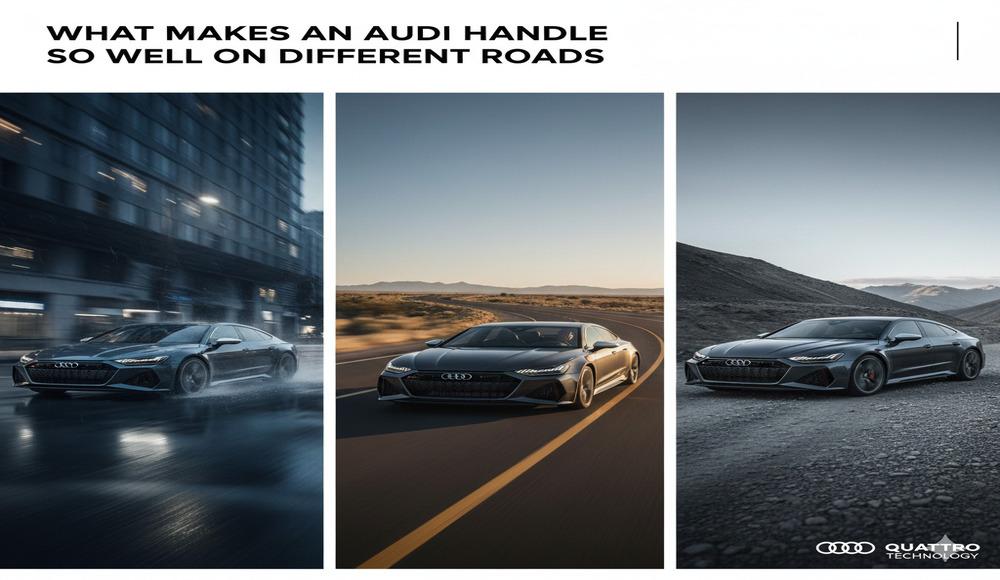Audi cars have built a strong reputation for confident stability, smooth control, and impressive balance across a variety of terrains.
This reputation is the result of careful German engineering, precise suspension tuning, and advanced digital systems that work together to enhance Audi handling performance. Drivers experience a combination of comfort and confidence whether moving through a tight city corner or accelerating on a wide highway.
For motorists in the UAE, these qualities matter even more. Roads in Dubai, Abu Dhabi, and Sharjah vary from silky highways to busy urban streets, along with areas where sand or uneven surfaces can affect traction.
The region also experiences intense heat, which influences road grip, tyre behaviour, and mechanical performance. Audi vehicles are engineered to remain steady in such conditions, allowing owners to enjoy long distance journeys, daily commutes, and high speed travel with dependable control.
Key Engineering Factors Behind Audi Handling
Audi’s strong road behaviour comes from a mix of mechanical precision and intelligent technology. Every part of the vehicle, from the drivetrain layout to the aerodynamic shape, is designed to improve stability and responsiveness. The brand focuses on consistent performance rather than short bursts of speed, which is why drivers often describe the experience as smooth, predictable, and secure.
The Role of quattro All Wheel Drive
Audi’s quattro system is one of the brand’s most recognisable technologies. It distributes power across all four wheels, allowing the car to maintain grip even when one or two wheels lose traction. This even power delivery is especially useful on surfaces that vary in texture or when roads become wet due to humidity or rainfall.
In the UAE, drivers may encounter sandy patches on highways, slippery roads after light rain, or uneven construction zones. Quattro helps the car maintain forward motion without wheel spin, giving the driver more confidence when accelerating, cornering, or travelling at higher speeds.
Audi Suspension and Shock Absorption
Audi is known for its refined suspension systems, especially adaptive suspension that adjusts automatically to changing road conditions. Sensors read surface texture and movement, then soften or tighten the suspension as needed. This gives the driver a comfortable ride on long highway routes while keeping the car firm and stable when entering sharp corners.
For UAE drivers who travel between cities like Dubai and Abu Dhabi, long distances combine with high temperatures that can make roads expand and develop bumps or rougher patches. The suspension is designed to reduce vibration, maintain comfort, and protect the vehicle’s balance even during sudden lane changes or quick braking.
Aerodynamic Body Design
Audi’s aerodynamic body structure plays a major role in handling. The sleek shape reduces wind resistance, especially when driving at higher speeds on open highways. Smooth airflow keeps the car stable and helps reduce body lift, which can otherwise make a vehicle feel light or unsettled.
This aerodynamic focus also supports better cornering control, since the car maintains a lower and more grounded stance. For drivers in areas with strong crosswinds, such as some highways outside Dubai, this design helps maintain stability and steering accuracy.
How Audi Performs on Different Types of Roads
Audi cars are engineered to handle a wide range of surfaces, making them suitable for both everyday use and long distance travel. In the UAE, roads vary not only in texture but also in temperature and traffic patterns. Audi’s systems help create a consistent feel for the driver regardless of these changes.
Smooth Highways and Fast Lanes
On long, smooth highways, Audi vehicles deliver a calm and controlled experience. The suspension keeps body movement minimal, reducing roll when changing lanes or taking curves. The cabin remains quiet due to sound insulation, aerodynamic design, and efficient vibration control.
These characteristics allow drivers in Dubai to maintain stable speeds on major routes like Sheikh Zayed Road, where fast moving lanes require quick yet controlled decision making.
City Traffic and Tight Turns
Dubai and Abu Dhabi city driving requires vehicles to react quickly to traffic flow, tight corners, sudden stops, and roundabouts. Audi’s steering system is designed for precision and lightness at low speeds, which helps the driver move smoothly in and out of crowded lanes.
The urban layout includes parking structures, narrow community roads, and busy junctions. Audi’s driving dynamics allow for easy control in these environments, making the car practical for daily commutes.
Rough, Sandy, or Uneven Road Surfaces
Although most UAE roads are well maintained, certain areas, especially near desert outskirts or developing communities, may include sandy or uneven patches. Audi suspension systems help absorb shocks from bumps, while stability control prevents skidding or losing grip.
Ground clearance is balanced to maintain stability on uneven surfaces without sacrificing highway performance. This balance allows drivers to travel confidently even when roads shift from smooth tarmac to rougher sections.
How Tyres Influence Audi’s Road Handling
Tyres play a major role in how any vehicle behaves, but they are especially important for performance focused cars like Audi. Tyre selection affects grip, braking distance, traction, comfort, and cornering. UAE temperatures create hot road surfaces, meaning tyres must remain durable and stable even under intense heat.
Choosing the Right Tyres for Grip and Stability
The width, tread pattern, and rubber compound of a tyre influence how well an Audi grips the road. Wider tyres provide more contact area, while premium tread patterns improve water drainage in wet conditions. Rubber compounds designed for high temperatures help maintain flexibility on UAE roads.
Drivers often compare premium options like audi tyres when evaluating the grip and stability needed for confident handling on UAE highways. Selecting the correct tyre type ensures better braking response and sharper cornering, especially at higher speeds.
Tyre Pressure and Heat Management in UAE
Tyre pressure changes rapidly in hot weather. A slight increase in temperature can raise air pressure inside the tyre, affecting grip, braking, and handling balance. For UAE drivers, it is important to check tyre pressure regularly, especially before long journeys.
Under inflated tyres can reduce stability, while over inflated tyres may lead to uneven wear or reduced traction. Maintaining correct pressure ensures smoother rides and protects the suspension from unnecessary stress.
Driver Assistance and Digital Systems That Boost Handling
Audi’s handling is supported by several digital systems that help keep the car stable and predictable. Electronic stability control adjusts braking on individual wheels to prevent sliding, while traction management ensures smooth acceleration even on slippery surfaces.
Drive Select allows drivers to switch between different modes. Comfort mode softens the suspension for long highway drives, while Dynamic mode sharpens steering and throttle response for twisty or performance oriented routes. Lane assist, hill hold control, and torque vectoring all work together to boost control, especially during sudden manoeuvres.
Benefits of Strong Handling for UAE Drivers
A car with strong handling is safer, more comfortable, and less tiring to drive. Audi’s balanced dynamics help reduce fatigue during long journeys across the Emirates, since the car remains steady rather than requiring constant corrections.
Better cornering stability helps during sudden lane changes or fast merging on Dubai highways. Strong handling also reduces wear on tyres and suspension, which improves long term maintenance and running costs. For families, the controlled ride offers peace of mind, while performance enthusiasts appreciate the precise response and strong grip.
Frequently Asked Questions
Why are Audi cars known for strong handling?
Because they use precise engineering, advanced suspension, and quattro grip systems.
Does tyre quality affect Audi performance?
Yes, tyres directly influence grip, braking, and cornering stability.
Is Audi good for UAE road conditions?
Yes, its suspension and traction systems handle highways, heat, and mixed surfaces well.
Do Audi driving modes change handling?
Yes, modes adjust steering weight, suspension feel, and engine response.
How often should Audi tyres be checked in UAE?
Check tyre pressure every two weeks and before long drives.
Final Thoughts
Audi vehicles offer exceptional handling across a range of road conditions because of their engineering, suspension technology, aerodynamic design, and advanced digital systems. From smooth highways to tighter city streets, the brand maintains a consistent balance of comfort and control.
Tyre choice, regular maintenance, and proper pressure checks also play a major role for UAE drivers, especially in hot weather. With the right care, Audi owners can enjoy confident and stable handling throughout their daily journeys and long distance travels.

